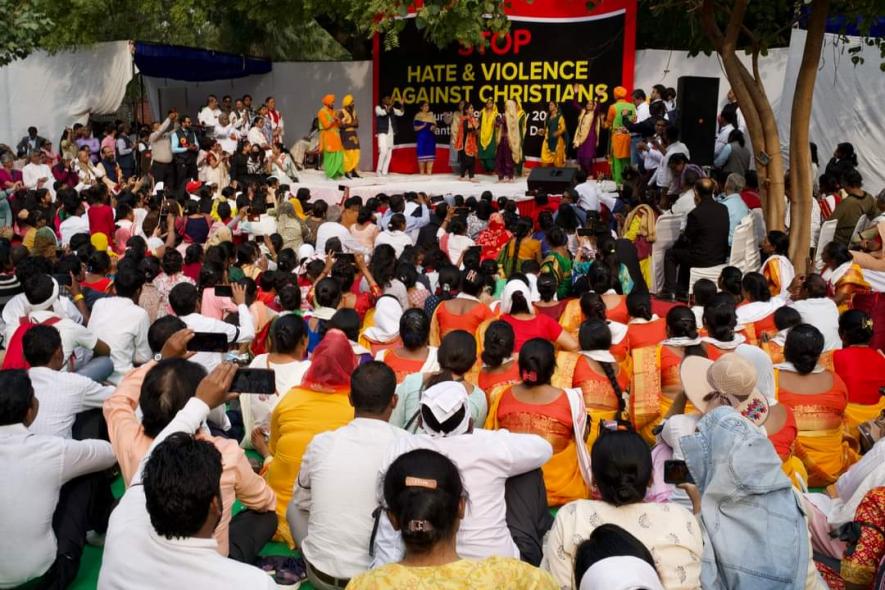‘Misuse’ of PESA Act in Ghar Wapsi of Chhattisgarh Tribal Christians: Report

Bhopal: The implementation of the Panchayat (Extension to Scheduled Areas) Act, 1996, (PESA) by Chhattisgarh last August has allegedly become a tool for ‘Ghar Wapsi’ of tribals.
Abusing the Act’s clause (d), under the influence of Hindu extremist groups, Gram Sabhas banished more than 1,000 tribal Christians from their villages because they refused to embrace Hinduism, according to a fact-finding team.
After reports of a series of attacks on Christians in Narayanpur and Kondagaon districts from December 9 to 18, 2022, the fact-finding team, comprising journalists and activists, met with the victims, locals and officials in tribal hamlets.
With the support of United Christian Forum (UCF), the team visited the affected villages on December 22-23 and released its in February 18. It comprised Ashok Verma, senior journalist from Ranchi; Irfan Engineer, director, Centre for Study of Society and Secularism, Mumbai; Nicholas Barla, Catholic Bishops Conference of India, New Delhi; Brijendra Tiwari, convener, All India People’s Forum, Chhattisgarh; and was assisted by Ajay Justice Shaw and others.
It reported attacks in 18 villages in Narayanpur and 15 villages in Kondagaon districts, which displaced about 1,000 Christian Adivasis.
The report claims that Christian tribals were banished from their villages and stripped of their properties and livelihood because they refused to denounce Christianity.
It was done under the garb of protecting ethnic tribal culture as granted under the Act’s Clause (d), which states: “Every Gram Sabha shall be competent to safeguard and preserve the traditions and customs of the people, their cultural identity, community resources and the customary mode of dispute resolution.”
The Congress-led Chhattisgarh government had notified the Act eyeing the sizable tribal vote ahead of the Assembly election this year.
Using the PESA Act as a tool, the Hindu right-wing influenced Gram Sabhas allowed only non-converted and Hindu tribals to remain in villages.
“The law, enacted to stop industrialists and businessmen from grabbing tribal lands without the Gram Sabha’s consent, is being used to keep Christians away from villages on the pretext of preserving the traditions, customs and cultural identity of tribals,” a member of the fact-finding team told Newsclick over the phone.
“The RSS influenced Gram Sabhas, formed after the PESA Act came into effect, passed draconian rules against Christian tribals. On the other hand, they are forcing tribals to embrace Hinduism in the garb of protecting indigenous culture,” the team member added.
The fact-finding report quoted Manglu Koram, from Madamnar village, as saying that he and members of 21 Christian families were taken to the village temple where the priest forcibly conducted some rituals and declared them Hindus. Copies of the Bible in their homes were also confiscated.
Similarly, 18 families from Udidgaon village, three from Fulhadgaon and another three from Putanchandagaon were forcibly converted to Hinduism. Even persons with disabilities, pregnant women and children were not spared.
Bangaram Sodi, president of Sarva Adivasi Samaj in Kondagaon district, and Dhantaraj Tandon of Sarva Anusuchit Jati Samaj told the fact-finding team that the RSS’s divisive campaigns against Christian Adivasis are causing disturbances in the area. They said that Adivasis should be free to choose their religion.
The report alleged that villagers who refused to embrace Hinduism were not only banished from their lands but also assaulted with bamboo canes, tyres and rods, their places of worship and homes vandalised, harvest burnt or plundered and livestock and others means of living snatched.
At least, 24 people had to be hospitalised with serious injuries like collar bone fracture, and head and wrist injuries.
“In villages where the PESA Act is effective, the decision of the Grab Sabha is supreme. It can’t be challenged by the district administration,” UCF member and writer John Dayal told Newsclick. “Therefore, they (Gram Sabha) passed discriminating laws.”
“But, their decisions override Article 25 and Article 14 of the Constitution—one gives liberty to propagate or practise any faith and the other ensures equality before law,” he added.
Instead of taking action, according to the fact-finding team’s report, the district administration is “pleading and persuading” the perpetrators to permit the displaced Christians to return to their villages. The administration feels that both sides are guilty of causing the conflict, as per the report.
The police turned a blind eye to a complaint of forcible conversion lodged last October 2022, the report alleged. “Despite the complaint, the government and the police ignored the early warnings of threat and intimidation targeting Christian Adivasis. No action was taken. The administration was lackadaisical even after a violent campaign against Christian Adivasis which commenced around December 9, 2022,” the report said.
“No action was taken even though the survivors of this attack filed their complaints with Benur Police Station and other police stations in Narayanpur.”
Referring to an incident highlighting the police inaction, the report alleged that three Christian tribal women were stripped publicly in the presence of 10-15 cops and forced to give up their faith in Temrugaon village, Narayanpur district, on December 27, 2022.
“The policemen did not stop them. With the perpetrators enjoying such impunity, the violence against Christians Adivasis continued to escalate, the report stated.
The fact-finding team said that when it met the Narayanpur district collector, he refused to share the action taken (FIRs and arrest) against the preparators. A couple of FIRs the team accessed were toothless and invoked trivial sections, diluting the gravity of the offences committed.
Almost a week after the team’s visit which questioned the police inaction over the complaint, a mob led by local BJP leaders allegedly vandalised a Catholic church and a grotto of Mother Mary in Edka village, Narayanpur district, on January 2.
The mob also attacked superintendent of police Sadanand Kumar, who and his team were trying to pacify people protesting alleged conversion by Christian missionaries. The following day, five BJP leaders were arrested in connection with the attacks.
The police also stopped state BJP leaders from visiting Narayanpur a day after the violence. “Missionaries attacked the police and protestors, who were peacefully demanding to stop the conversion,” tribal BJP leader and former Narayanpur MLA Kedar Kashyap told the media when stopped. “They were protesting when the collector and the police failed to curb the mass conversion of tribals. They are ruining tribal culture, customs and temples,” he alleged.
Kashyap added that MLAs and MPs were “stopped from visiting the area but missionary men were given a free run”.
According to sources, Narayanpur BJP district president Rupsai Salam has been leading the Ghar Wapsi movement in the region for the last few months.
The police also arrested more than 30 Christian pastors and priests for retaliating to the attack. They were sent to jail after the local court rejected their bail applications.
Despite repeated attempts, Narayanpur Police and district administration were unavailable for comments.
According to the UCF, Chhattisgarh reported 132 atrocities against tribal Christians in 2022, second in the country 186 cases in Uttar Pradesh. The UCF recorded 598 cases of atrocities against tribal Christians spanning over 22 states last year as against 505 in 2021.
In almost all the incidents, vigilante mobs of religious extremists used threats, coercion and aggression. They seem to enjoy a sense of immunity from the rule of law as police and local media often accompany them, the report alleged.
The report further said that the police in such cases “act without any application of mind”. It is “apparent that such complaints filed by religious extremists are politically motivated to polarise society often for obvious electoral gains like in the upcoming elections in a few states”.
Tracking similar statistics, the 2023 annual report of the Federation of Indian American Christian Organizations of North America (FIACONA) released on January 30 claims a much higher number of incidents of violence against Indian Christians—1,198 in 2022, a massive 157% rise from 2021.
According to the report, the financial loss incurred by Indian Christians due to lynchings, damages to churches, homes and properties, jail time, psychological and emotional toll, and legal fees to defend against false charges are estimated around $56 million for 2022 alone.
The fact-finding team made eight recommendations demanding immediate government intervention to facilitate the return of Christian Adivasis to their villages, ensure privacy, security and sanitation in the relief camps, strict action against forcible conversion, and compensation to the victims.
(With PTI inputs)
Get the latest reports & analysis with people's perspective on Protests, movements & deep analytical videos, discussions of the current affairs in your Telegram app. Subscribe to NewsClick's Telegram channel & get Real-Time updates on stories, as they get published on our website.
























